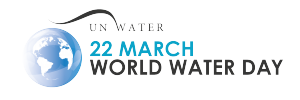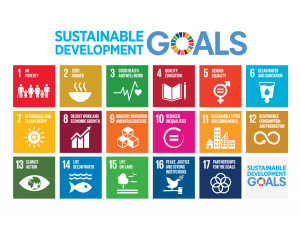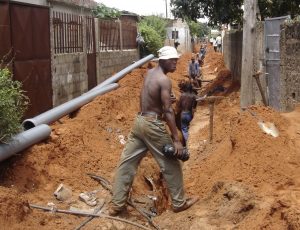Local leadership to leave no-one behind
The 2019 World Water Day is focusing on the huge challenge – to leave no-one-behind.
This year’s World Water Day focus is one of the most significant shifts from the Millennium Development Goals (MDGs), which aimed to increase percentage coverage, to the Sustainable Development Goals (SDGs), which aim to reach everyone.
People are left behind because of inequalities in WASH access, which, in turn, are based in the deeply entrenched global, national, local and household level inequalities caused by economic, social and political dynamics.
By definition the people who are hard to reach with sustainable services are very hard to reach.
It can only be done by a huge concerted effort, where all actors come together with joint commitment to find ways to overcome the barriers to reach the last mile. Those in most danger of being left behind include people who are hard to reach because of where they live – areas that are remote or vulnerable to disasters, or perhaps informal areas in towns and cities. It includes people who are left out because they are part of a population group that is discriminated against, for example by caste, religion, ethnicity, occupation, or because they are displaced or homeless. It also includes people who are disadvantaged because of gender, disability, and age or health status. And of course, all of these factors overlap and reinforce each other, and all are exacerbated by poverty and limited resources. Together we need to raise political commitment and find ways to turn this commitment into action.
“Effective service provision relies upon the collective actions of interdependent stakeholders” – IWA Lisbon Charter
Some of the most important stakeholders in achieving the dedicated water goal SDG6 are: utilities, regulators, governments, and civil society. This is why at WaterAid and IWA, we are both committed to focus on those who have been left behind through our direct interventions and through our influencing work. We are looking closely at the blockages and opportunities throughout all the systems and institutions responsible for water supply and sanitation. We need to see what must be done differently to reach people who are hard to access.
“In Burkina, as well as in many other similar countries, it is important to understand that realizing the human rights is far from just building more WASH facilities; is about developing strong country systems that can deliver adequate services that last”–said Mr. Juste Nansi, IRC Country Director in Burkina Faso on the occasion of the presentation of the French version of the IWA Manual on the Human Rights to Safe Water and Sanitation for Practitioners. “This manual provides concrete opportunities for improving regulatory frameworks, rules and operating guidelines and will importantly contribute to the capacity development in the sector”, he continued.
Safe drinking Water and Sanitation are recognised as human rights since 2010, which means that they are framed by international human rights law and are guided by the human rights principles.
The principle of equality and non- discrimination is central.
This principle provides a legal basis for putting a priority on those who are left behind, as well as a moral incentive. “While governments are the duty-bearers for the implementation of the Rights, they need to rely on actors in the field to make progress, achieve targets and monitor the evolution towards universal rights,” says Professor Kala Vairavamoorthy, IWA Executive Director. “Think of it any time you use safe water, or when you use a clean sanitation facility: these are not just facilities; they are your Right –your Human Right! And this Right remains denied to billions of people around the world! IWA helps practitioners make universal coverage a reality”, states Vairavamoorthy.
In efforts to turn this moral and legal imperative into practical action, water professionals and practitioners in IWA and WaterAid, have looked into what the human rights principles mean and translated them into practical guidance for some of the most important actors in the water and sanitation arena: utilities, regulators and local governments. Experience shows, when these actors have the chance to reflect on their responsibilities they find it very constructive: “It is actually very enlightening to reflect on our own roles, it is an opportunity to think about new ways to address our day to day challenges”, Mr. Habtamu Dendea Jara, utility office head in Gololcha, Ethiopia, said after discussing how the human rights principles apply to his work.
What are the specific roles and responsibilities of utilities and regulators? What do they need to know? How can they do their job in a way that helps to fulfill, respect and protect the human rights to water and sanitation?
“Regulators are not in the grandstand, watching the game to develop. We must go down to the field and make our best effort to make the things happen, in the proper and fastest way. There are lives in the play. There is no time to waste.” Says IWA member Alejo Molinari, regulator in Buenos Aires, Argentina.
Participation is another core principle of human rights, but duty bearers are often reluctant to engage with rights holders when they do not feel they are able to meet demands. When we frame the rights principles in a different way, the duty bearers can see how they actually help them: Tseguereda Abraham of WaterAid Ethiopia held a workshop for local government officials in the remote district of Gololcha to discuss the Human rights principles from their perspective. “When building our team, we have learned to think of better participation. Having the community feel they are the real owners of the project, helped us work better to solve problems and increase belief and hope in our activities”, said one local government official.
Others in the workshop stated: “Engaging leaders and people with influence when doing our work can make a great difference, leaders can help channel more resources, promote achievements to help us demonstrate resources are well spent, get communities support to help us work better.” The workshop was based on the Making Rights Real approach, developed by WaterAid along with WASH United, ISF, EndWater Poverty, UNICEF, RWSN and Simavi. It is particularly designed for local government officials, to whom responsibility for leaving no-one behind has been delegated through decentralisation.
Local governments are, however, usually terribly constrained by lack of resource and capacity. So the Making Rights Real approach aims to bring civil society and local government together to find ways to share resources and influence, to keep services running and to reach everyone.
These experiences show how it is possible to bring together all the different actors to help address the enormous challenges of achieving universal access to water and sanitation by 2030, using the human rights framework as inspiration and guidance.
IWA has developed a manual on human rights to water and sanitation for staff in service providers and regulators, whilst WaterAid, with other organisations, has developed human rights materials for local government officials.
To find out more about the Human rights to water and sanitation and the respective IWA and WaterAid manuals and how they were developed please see the following links:
- IWA – Human Rights to Water and Sanitation
- IWA Water and Development Congress & Exhibition, Colombo, Sri Lanka, 3-5 December 2019
- For more information on “How the Making Rights Real” materials were developed, please click here.
- Download the “How Making Rights Real” materials from here.
More about WaterAid: here






